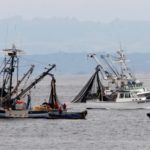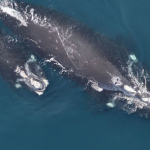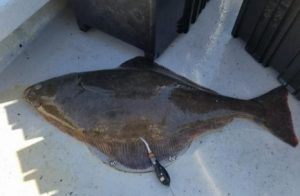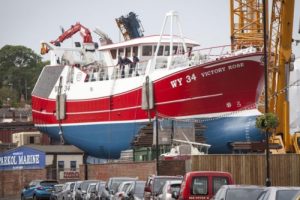Tag Archives: North Atlantic Right Whale Consortium
Right whale population grows 4%, but extinction remains a threat
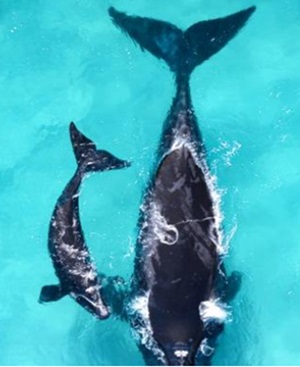 Conservationists are calling on the government, shipping and fishing industries to save the North Atlantic right whale from extinction despite an increase in its population. Researchers studying the whales said this week that the population increased to an estimated 372 in 2023. That’s an increase of about four percent from 2020, and “heartening news” after the whale’s population fell by about 25 percent from 2010 to 2020. The population of the right whale, which can weigh up to 150,000 pounds (68,039 kilograms) and lives off the East Coast, plummeted in the 2010s. Stressed by global warming and vulnerable to ship collisions and entanglement in fishing gear, their numbers fell to fewer than 360 by the early 2020s. more, >>CLICK TO READ<< 12:29
Conservationists are calling on the government, shipping and fishing industries to save the North Atlantic right whale from extinction despite an increase in its population. Researchers studying the whales said this week that the population increased to an estimated 372 in 2023. That’s an increase of about four percent from 2020, and “heartening news” after the whale’s population fell by about 25 percent from 2010 to 2020. The population of the right whale, which can weigh up to 150,000 pounds (68,039 kilograms) and lives off the East Coast, plummeted in the 2010s. Stressed by global warming and vulnerable to ship collisions and entanglement in fishing gear, their numbers fell to fewer than 360 by the early 2020s. more, >>CLICK TO READ<< 12:29
9 North Atlantic right whale calves born so far this breeding season
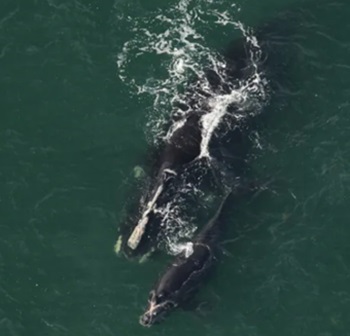 One month into the breeding season for North Atlantic right whales, nine calves have been born. Amy Warren, an assistant researcher at the New England Aquarium’s Anderson Cabot Center for Ocean Life, said she’s crossing her fingers for more births, but that the count at this stage is pretty much on par with previous seasons. “It’s been hard to judge because the trends have shifted a little bit earlier some years, a little bit later some years,” Warren said. “Last year at this time, I believe we had 10 calves. So we’re really not far off from that.” Photos, more, >>click to read<< 09:29
One month into the breeding season for North Atlantic right whales, nine calves have been born. Amy Warren, an assistant researcher at the New England Aquarium’s Anderson Cabot Center for Ocean Life, said she’s crossing her fingers for more births, but that the count at this stage is pretty much on par with previous seasons. “It’s been hard to judge because the trends have shifted a little bit earlier some years, a little bit later some years,” Warren said. “Last year at this time, I believe we had 10 calves. So we’re really not far off from that.” Photos, more, >>click to read<< 09:29
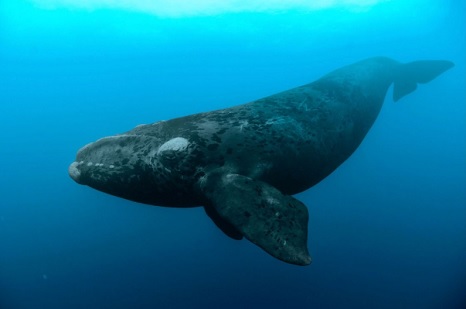
Are right whales big business for nonprofits?
Forget the green economy, the deep blue economy has it beat by a nautical mile. Ever wonder how much money is spent trying to protect the North Atlantic right whale? Ask any of the non-profit corporations that participate in funding to save them. Here in Maine, at least nine non-profit organizations support right whale conservation efforts, in addition to state agencies and the University of Maine. Nationally, the North Atlantic Right Whale Consortium shows 47 environmental organizations it identifies as “partners” on its website. Another 37 environmental groups signed a PEW charitable trust letter to Congress last March, critical of what it believed to be too little funding to protect the species. more, >>click to read<< by Jane Carpenter 08:36
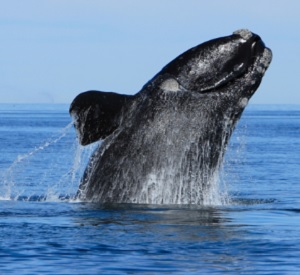
North Atlantic right whale population has steadied, scientists say
The population of critically endangered North Atlantic right whales appears to have levelled off after a decade of steep decline, according to updated data released this morning by Canadian and American scientists. Every fall, the North Atlantic Right Whale Consortium releases its best population estimate of the world’s most threatened large whale. Scientists in the consortium said Monday that the 2021 estimate of 340 North Atlantic right whales in existence has been recalculated to 365 primarily because of the number of calves born that year. The estimate for 2022 is 356. >>click to read<< 09:52

North Atlantic right whale’s decline slows, but population falls again
The decline of an endangered species of whale slowed last year, as it lost about 2% of its population, but scientists warn the animal still faces existential threats and is losing breeding females too fast. The North Atlantic right whale’s population was more than 480 in 2010 and fell by more than 25% over the following decade. The North Atlantic Right Whale Consortium, a group of scientists, government officials and industry members, said Monday that the population fell to an estimated 340 last year. That is a decline of eight animals from the previous year, when the population was initially thought to be even fewer. >click to read< Meanwhile in Canada, no right whale deaths have been reported in Canadian waters in three years. >click to read< 08:02
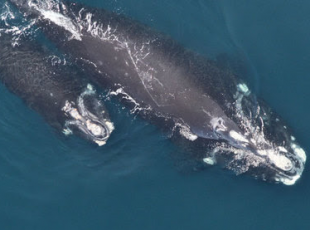
Canada, U.S. researchers gathering virtually to report on right whales
Researchers from Canada and the U.S. are gathering virtually this week for an annual conference that focuses on an endangered whale species. The North Atlantic Right Whale Consortium, which brings together academic researchers, government agencies, shipping and fishing industries and conservation organizations, is expected to release part of a yearly report card on how the whales are faring. ,, So far this year, one right whale has been found dead in U.S. with wounds that suggested a vessel strike. There have been no reported deaths in Canadian waters so far in 2020. >click to read< 09:40
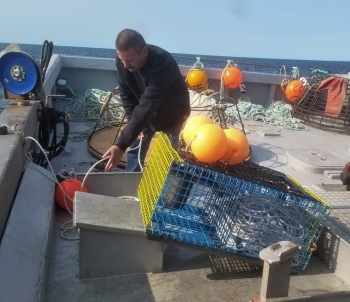
At the Ropeless Consortium’s second annual meeting
Scientists, fishermen and policy makers met on Wednesday in Maine to discuss this issue at the Ropeless Consortium’s second annual meeting. The North Atlantic Right Whale Consortium will continue the discussion of right whale conservation at their annual meeting Thursday and Friday.,,, “We here at the aquarium have been working hard on looking at reducing rope strengths and trying to get rope-less fishing as an option to reduce risk,” said Amy Knowlton, a Ropeless Consortium board member and senior scientist at the New England Aquarium. >click to read< 10:35
SeaWorld & Busch Gardens Conservation Fund Commits $900,000 to Protect Critically Endangered North Atlantic Right Whales – The announcement was made by Dr. Michael Moore of the Woods Hole Oceanographic Institution, during yesterday’s 2019 Ropeless Consortium meeting, >click to read<
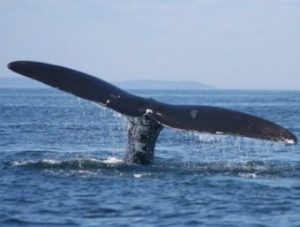
Eighteen scientists, environmentalist, blast Maine lobstermen’s stand on whale safety
“Reducing entanglement in East Coast waters of the United States is a critical part of a comprehensive strategy for right whale survival and recovery,” Scott Kraus, chief scientist for marine mammals at New England Aquarium’s Anderson Center for Ocean Life, and Mark Baumgartner, associate scientist at Woods Hole Oceanographic Institution and chairman of the North Atlantic Right Whale Consortium, said in a letter Tuesday to Sen. Susan Collins, R-Maine. >click to read< 19:44

“We’re expecting 100 per cent compliance,” New snow crab fishing rules rein in use of ropes to protect North Atlantic right whales
Fisheries and Oceans Minister Dominic LeBlanc has announced four changes to the snow crab fishery in the southern Gulf of St. Lawrence to protect North Atlantic right whales from entanglement, including reducing the amount of rope floating on the surface and mandatory reporting of all lost gear. The new management measures will take effect immediately and will be enforced “very aggressively,” LeBlanc said during the news conference in Moncton on Tuesday. >click here to read<16:29
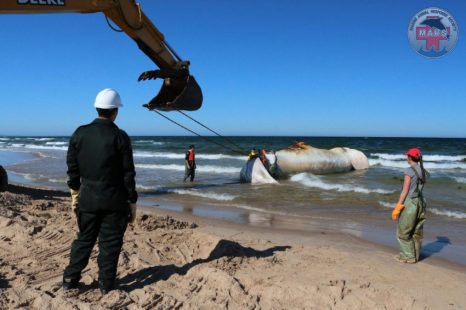
Here’s why 12 right whales died in Canadian waters — and why more will die if nothing is done
A macabre joke in the field is that there are more North Atlantic right whale researchers than actual North Atlantic right whales. The scientific community is tight-knit: on top of the hours many of them spend sardined together on research boats and survey planes, a consortium dedicated to studying and conserving the species gathers every year for a meeting that tips further towards family reunion than your average academic conference. Still, as biologists, conservationists and policy-makers began filling an auditorium at St. Mary’s University very early on a Sunday morning in late October, the emotional register of the meeting felt unusually charged. Attendees greeted each other with bracing hugs. click here to read the story 12:27
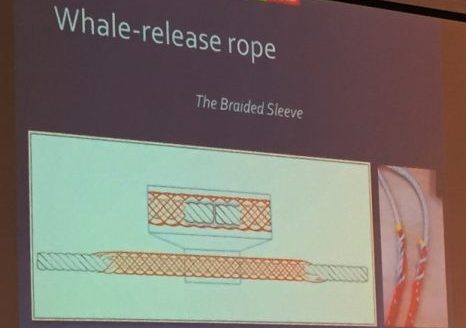
Changes can be made right now to save right whales, says fisherman
Fishermen in Nova Scotia’s snow crab industry say they are already making some immediate changes to prevent more deaths of North Atlantic right whales. Gordon MacDonald, managing director of the Snow Crab Fishermen’s Association off of southeastern Cape Breton, said he and other fishermen are already looking at ways to reduce the amount of slack rope attached to traps during the April-to-August snow crab season. “It’s easy, it’s quick and we can get on it right away and see how that goes and then get into other things.” He said the industry doesn’t need to wait for more study and changes to government regulations. “We can’t wait for that development to start doing things that have a positive impact,” he said. click here to read the story 09:53

North Atlantic Right Whale Consortium – scientists say Right whales could be 20 years away from certain extinction
Scientists at an annual meeting for North Atlantic right whales estimate the species has a little over two decades left to survive unless changes are made immediately. The North Atlantic Right Whale Consortium’s annual meeting was held in Halifax on Sunday, and all of the scientists spoke with a sense of urgency about the fate of these whales. This summer, at least 15 right whales died in Canadian and U.S. waters and scientists at the conference stressed that human activity is the primary cause of death for all right whales. click here to read the story 11:21
Conservationists plan to sue over right whale deaths
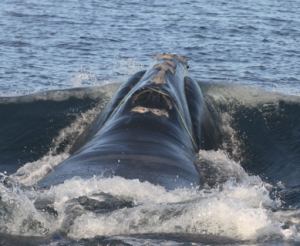 Animal conservation groups say they intend to sue the U.S. government unless North Atlantic right whales are better protected, following the deaths of 15 along U.S. and Canadian coasts. “We are literally facing the extinction of right whales due to human causes,” said Regina Asmutis-Silvia of Whale and Dolphin Conservation North America. In August, the National Oceanic and Atmospheric Administration, along with Fisheries and Oceans Canada, declared the deaths of North Atlantic right whales since June 7 an “unusual mortality event,” which triggered a focused and expert investigation into the causes. But the conservation groups want more. click here to read the story 10:01
Animal conservation groups say they intend to sue the U.S. government unless North Atlantic right whales are better protected, following the deaths of 15 along U.S. and Canadian coasts. “We are literally facing the extinction of right whales due to human causes,” said Regina Asmutis-Silvia of Whale and Dolphin Conservation North America. In August, the National Oceanic and Atmospheric Administration, along with Fisheries and Oceans Canada, declared the deaths of North Atlantic right whales since June 7 an “unusual mortality event,” which triggered a focused and expert investigation into the causes. But the conservation groups want more. click here to read the story 10:01
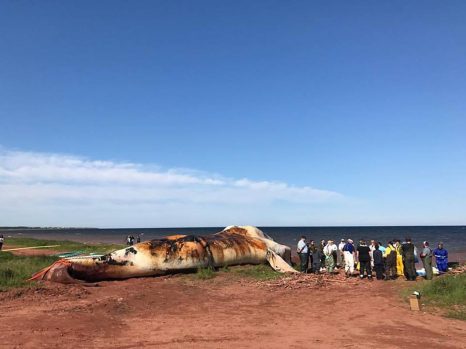
Preliminary findings of necropsies -Two whales suffered blunt trauma, another killed by fishing gear
Injuries suffered by at least two of six North Atlantic right whales found floating lifeless in the Gulf of St. Lawrence appear to be consistent with ship strikes, marine mammal experts say. Tonya Wimmer of the Marine Animal Response Society said Tuesday that the preliminary findings of necropsies on three of the whales indicate that two of them sustained blunt traumas that caused extensive bruising along their sides and internal hemorrhaging. A third died after becoming snarled in fishing rope that wrapped around one flipper and inside its mouth. click here to read the story ,,,, Whale deaths raise concern – The first dead whale spotted on June 6 was a 10-year-old male who was last seen in Cape Cod Bay on April 23 by the Center for Coastal Studies. The elapsed time between those sightings was only about six weeks. The other identified dead whales included two adult males, at least 17 and 37 years old, and a highly valuable 11-year-old female. Through DNA analysis, two of the males were known to have sired calves. The two remaining unidentified whales were a male and a female. click here to read the story 14:11

































